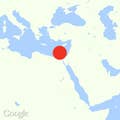CAIRO — To the Egyptian state, Khaled al-Balshy is public enemy number one. In the three years since a military coup toppled the country’s elected government, he has been charged with trying to overthrow the government of President Abdel-Fattah al-Sisi, rioting, damaging public property, harboring fugitives from the law, blocking public roads, illegally protesting in the streets, and insulting the police. He has been described in the pro-government press as a communist, a paid foreign agent, an anarchist, and a member of the outlawed Islamist Muslim Brotherhood.
Balshy is a journalist, and until recently served as deputy head of the country’s press syndicate. A bookish, disheveled 45-year-old, in rectangular eyeglasses, Balshy is the editor of an independent news website called al-Bedayaiah, which means “beginning.” His wife, Nafisa el-Sabbagh, is also a journalist. The pair divide their time time between newsrooms, the press syndicate headquarters, and caring for their two kids, 16-year-old son Ali, and 9-year-old daughter Bassil. When Balshy’s not at home, at work, or out talking politics with friends, he spends a lot of time at various courthouses, both for his own pending cases and to keep tabs and offer support for the scores of other journalists run being run through the grinding, degrading machinery of Egypt’s judiciary.
He laughed at the charges against him. He said he’s never done anything violent in his life. In fact, during demonstrations last year against the Sisi government’s attempted transfer of two Red Sea islands to Saudi Arabia, he was regarded as the voice of reason. “I was the one who advised people to go home, and I tried to communicate with the security officials,” he said. “I wanted them to stop beating people.”
Eventually, Balshy grew used to living in what he describes as a “traditional dictatorship,” where the court appearances and public smears became humdrum. He even dared grow hopeful at signs of dissatisfaction, including widespread opposition to the Red Sea islands deal, as well as sporadic shows of spine by the judiciary and small spontaneous demonstrations against police brutality or the price of bread.
Egypt is perhaps the best example of a US ally trying to keep a lid on both security challenges and public demands for change.
As the military-dominated government under Sisi widened its crackdown on media, civil society, and dissidents, democracy activists often turned to the international community for support. This frequently came in the form of subtle warnings by the US and others that continued military aid was contingent on the country’s democratic progress or simply statements standing up for those targeted in the crackdown — in some cases lending them just enough backing to be released from jail or allow their work to continue.
But then Donald Trump was elected president, and everything appeared to get worse. On November 19, ten days after Trump was elected, an Egyptian court sentenced Balshy and two colleagues to one year in prison. They are out free while appealing. More charges were lodged against him, and more smears against him appeared in state media or pro-government yellow press run by Sisi’s sycophants.
These are grim, trying times for democracy activists in Egypt and elsewhere in the Middle East. The 2011 Arab Spring uprisings against longtime rulers, led by liberals like Balshy, have been brutally crushed, or hijacked by generals and warlords. In Egypt, Sisi has outlawed the largest political party and blocked even legal ones from most activities as they smother the country's last independent institutions. The activists resisting this worry their last ray of hope may be flickering out by the Trump effect; if the US no longer uses human rights to pressure regimes, authoritarians like Sisi will tighten their grip.
In the past few months, the space for dissent has shrunk even further. In late November, Sisi’s rubber-stamp parliament adopted a draconian law on non-government organizations that if enacted would effectively shutter any independent human rights or civil society groups. Government enforcers on February 9 closed one of the last local human rights groups, the El Nadeem Center, which documented cases of torture and counseled survivors. On March 18, Balshy and his liberal-minded colleagues were shoved out of the leadership of the journalists’ syndicate and replaced with Sisi acolytes.
“I do think there’s a very, very recent escalation after Trump’s election,” said Salma Shash, of the Bread and Freedom Party, a small leftist political group that is attempting to establish itself in Cairo and elsewhere. “With Trump’s election, civil society and democratic forces in Egypt and elsewhere have really lost something. Whether we admit it or not, it does make a difference who’s in the White House.”
Activists, scholars, and diplomats believe that the Trump administration’s emphasis on security and Trump’s personal affinity with strongmen like Russia’s Vladimir Putin will give Sisi an even freer hand. Egypt’s president is scheduled to meet with Trump in Washington on Monday, and the White House signaled Friday that longstanding concerns about political repression, torture, extrajudicial killings, and wrongful imprisonment in the world’s largest Arab country would fall to the wayside. “President Sisi has taken a number of bold steps on very sensitive issues since becoming President in 2014,” a senior administration official said in a briefing ahead of Sisi’s visit. "He’s called for reform and moderation of Islamic discourse, initiated courageous and historic economic reforms."
“The Sisi regime has started to feel it has backing for its actions,” Balshy said during an interview at his office. “Not just because of Trump but because of many Trumps. Sisi is part of a movement of the right. There’s now a Trump of Syria, a Trump of Egypt, a Trump of Russia, a Trump of North Korea, a Trump of France.”
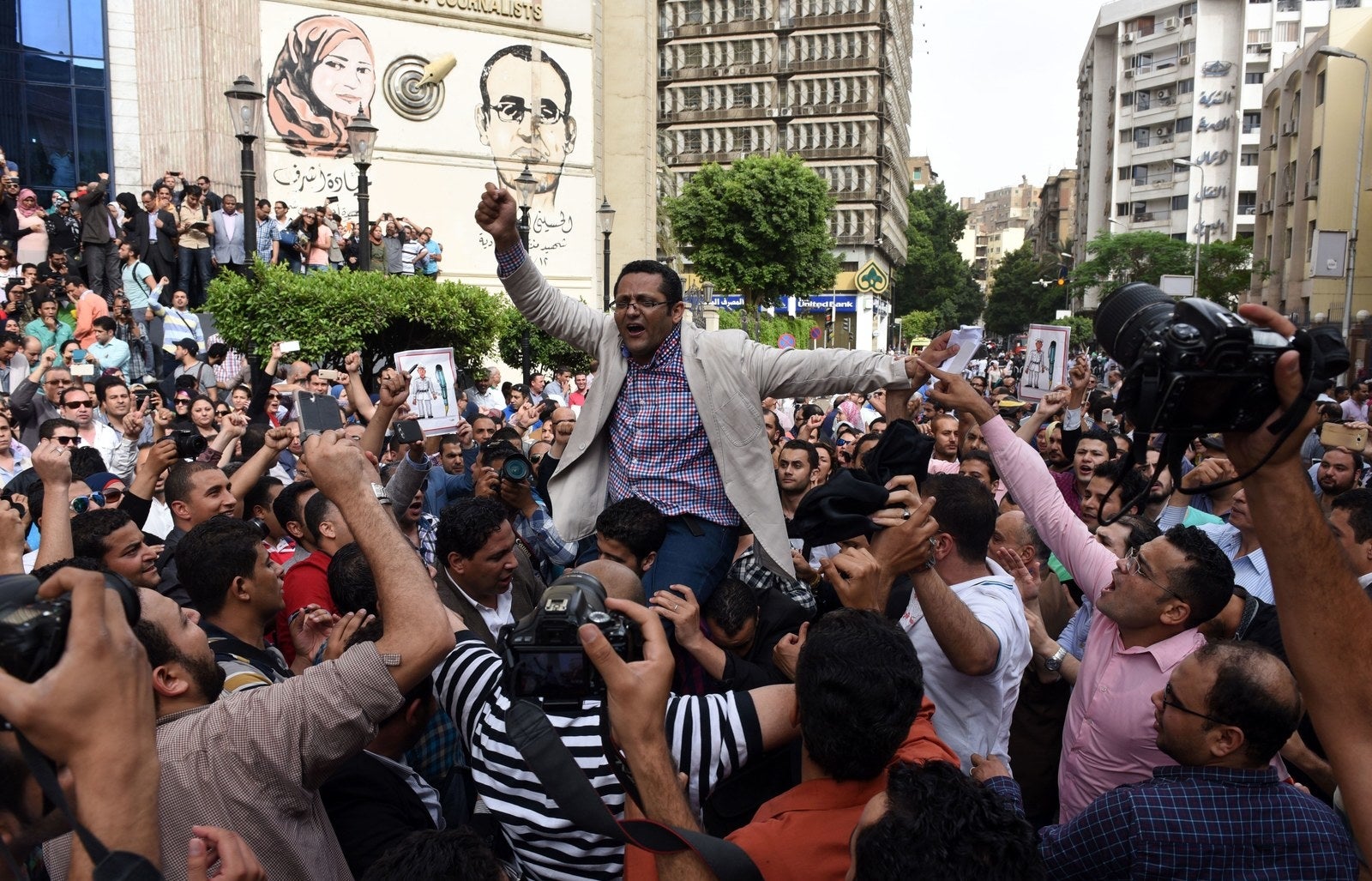
Last year, Balshy was summoned to one of central Cairo’s grimy police stations. They wanted to know why he was allowing journalists wanted by the authorities to shelter in the syndicate offices during the protests against the sale of the islands. They asked him about everything from his recent whereabouts to his role in the 2011 Tahrir Square uprising against longtime ruler Hosni Mubarak. He quickly realized he would be held up for a long time.
His wife was in Denmark for a workshop at the time. Who would take care of their kids? And would they begin to panic over his absence? He arranged for his sister-in-law to keep an eye on them. When he managed to get through to Ali on the phone, he told him vaguely he would probably be home late that night.
“Come on, Dad,” his son said to him. “Just admit you were detained.”
The news was already all over Facebook, Ali informed his father. “Somehow,” Balshy said with a sigh, “Ali is being drawn into this world.”
“Come on, Dad,” his son said to him. “Just admit you were detained.”
It wouldn’t be a big surprise if his son followed in his footsteps. Balshy said he comes from a family that has politics coursing through its veins. Though Egypt’s democracy movement gained international attention with the 2011 uprisings, people like Balshy have been agitating for decades, battling against an authoritarian state as well as Islamist populists who they accuse of seeking a different kind of autocracy.
Egypt is perhaps the best example of a US ally trying to keep a lid on both security challenges and public demands for change. It receives nearly $1.3 billion a year in military aid in its fight against Islamist extremists while attempting to contain, co-opt, and adapt to the aspirations of a largely youthful population wary of the oligarchs and generals who run the country.
The ascent of Trump and the rise of the far-right worldwide appears to be cheered by authoritarians in places like Egypt. Sisi was almost visibly overjoyed by Trump’s election; Egypt’s president was the first world leader to congratulate Trump. Pro-government media was ecstatic over Trump’s election. After chilliness from then-president Barack Obama, Sisi seemed to glow at the prospect of dealing with Trump in the White House. “The victory of Trump is an earthquake that disrupted the Muslim Brotherhood, and the forces who get paid by the Americans,” said Abdel-Rahim Ali, a pro-government lawmaker and TV presenter, hours after seeing the results of the Republican’s upset victory.
“Pro-government people were cheering when election results were out,” said Amr Abdul Rahman, a human rights lawyer at the Egyptian Initiative for Personal Rights, one of the few advocacy groups still operating. “In very loud, clear, and uncompromising language they were saying, ‘Finally we have an American president who is with us.’”
Unlike under Obama, or even his predecessor, George W. Bush, the White House now appears to view the Middle East and much of the world solely through cooperation on security and counterterrorism. That’s music to the ears of the region’s autocrats, including the monarchs of the Gulf, the leaders of Algeria, Morocco, and Jordan, as well as Egypt.
“Sisi’s sacrificing of human rights and democracy for the sake of stability resonates with Trump’s own worldview, which includes waterboarding prisoners and even killing the innocent relatives of terrorists,” said Timothy Kaldas, a political scientist in Cairo. “Now if the government would pursue a crackdown, they wouldn’t have to worry even about a negative statement coming out of the US.”
Even those who have been harshly critical of the US and its role in the region lamented the effect Trump would have on their causes. “It’s going to get harder, a lot harder, for everyone,” said Wael Eskandar, a noted leftist journalist and blogger. “The danger of Trump is not in the actions he takes but in the rhetoric he spreads and the people that are emboldened by that rhetoric.”
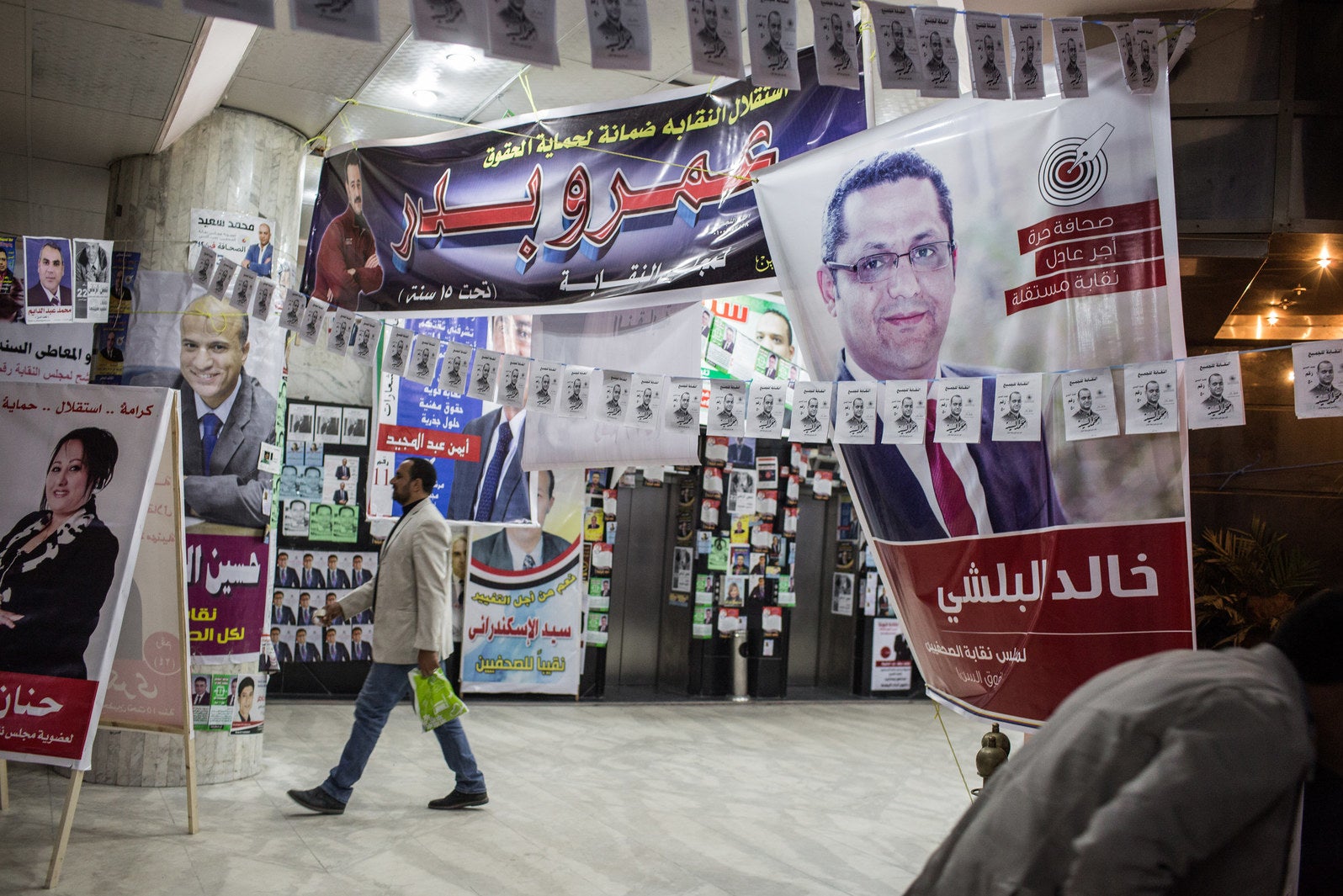
The US has a long, troubled, and contradictory history of promoting democracy in the Arab world. US officials have often spoken grandly of promoting liberal values while cozying up to dictators. Deeply unpopular US military interventions in Iraq and Afghanistan have further poisoned America’s brand.
“There’s no formula to stay safe.”
But in fits and starts, the US has also sought to encourage political and economic reforms that included multiparty elections, respect for human rights, and reducing corruption and cronyism in business. Those initiatives became more defined after the September 11 attacks, and then-president George W. Bush based his freedom agenda on the idea that “expanding liberty and democracy will help defeat extremism and protect the American people.”
Over the years, US policy has been a kind of discordant duet. The US continued cutting deals with authoritarian leaders while US officials and charities built strong ties with civil society groups and dissidents, trained democracy activists, and organized workshops for political parties, journalists, and intellectuals. Celebrations at Western embassy gardens became awkward affairs as generals and activists harrumphed at each other while serving themselves hors d’oeuvres and cheap wine.
Even after Egypt’s 2013 coup, as Sisi outlawed the popularly elected Muslim Brotherhood and jailed thousands, US officials continued to issue statements that stood up for the rights of the detained and oppressed. Yes, they were just statements, but sometimes they made a difference, perhaps giving activists a bit of leeway to agitate for change.
“It’s not a big space, but the rhetoric gives us some space,” said Balshy.
Scholars, activists, and diplomats worry the rise of Trump and a new breed of right-wing politics will change that, shrinking the space for political agitation while giving authoritarian rulers more freedom to act. Trump has already indicated he would not criticize authoritarian states for such abuses. "There are a lot of killers,” Trump told Fox News’ Bill O’Reilly when asked about Putin’s alleged human rights abuses and foreign interventions. “You think our country's so innocent?" He said the same about Turkey, when asked about the country’s crackdown on dissidents following a failed July 15 coup attempt: “I think right now when it comes to civil liberties, our country has a lot of problems,” Trump told the New York Times. “I think it’s very hard for us to get involved in other countries when we don’t know what we are doing and we can’t see straight in our own country.”
It’s more than words. Trump’s secretary of state, Rex Tillerson, recently became the first top US diplomat in years not to personally present the State Department’s annual report on human rights. (He has also suspended press briefings.) On March 29, the Trump administration lifted human rights conditions for selling fighter jets to Bahrain, a hereditary monarchy that is brutally suppressing its Shia majority.
“This is not an environment in which democracy promotion can flourish,” said Amr Abdul Rahman, the human rights lawyer.
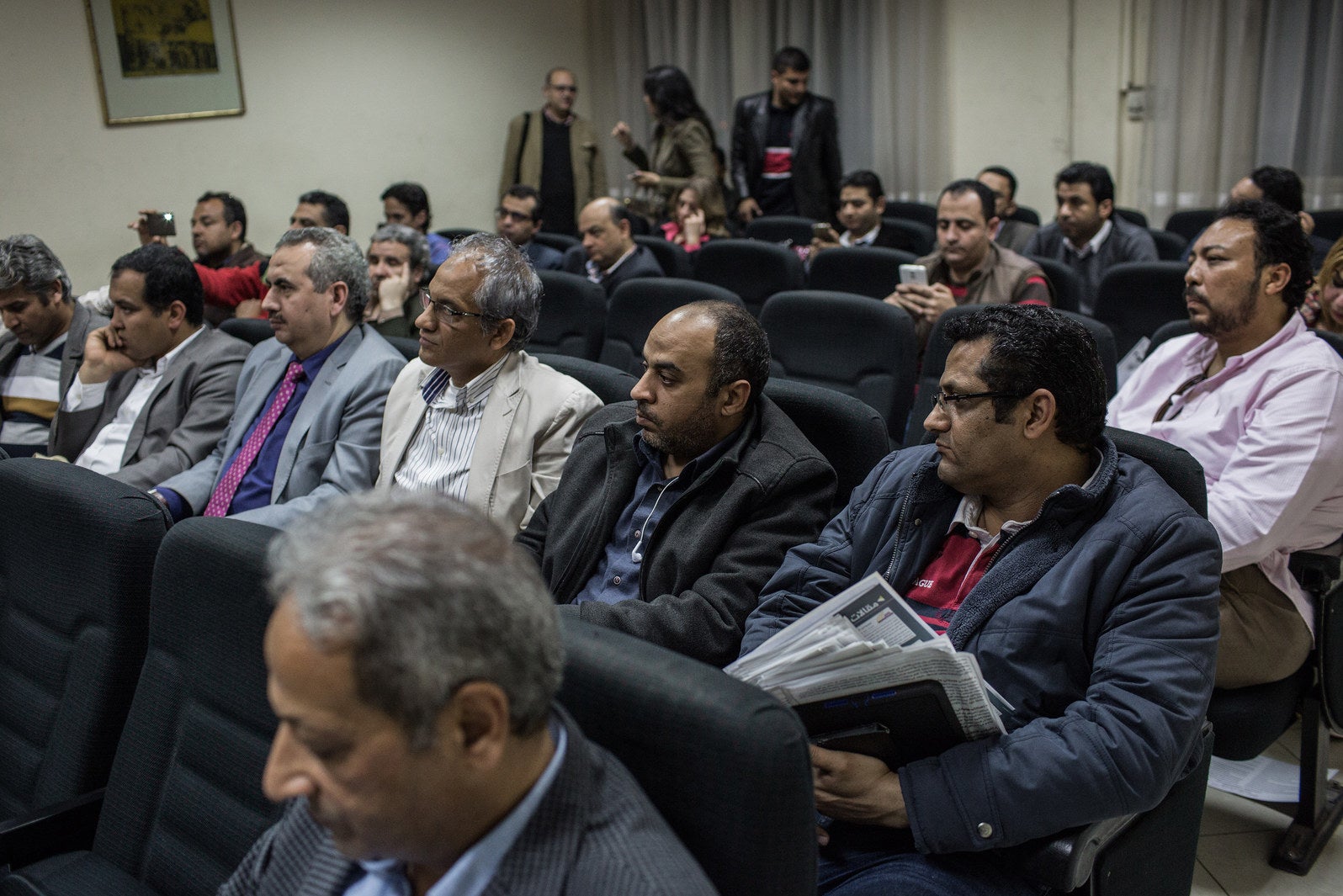
Advocates are alarmed that the fragile, relatively recently minted network of international organizations, treaties, and monitoring groups promoting human rights standards throughout the world could be drastically weakened and even imperiled. “We haven’t seen what happens to the human rights system without the US supporting it,” said Keith Harper, a former US ambassador to the UN Human Rights Council. “For the last 70 years since the second world war, the US has taken the position that it will promote human rights internationally, and as a part of that, democracy. What we see is a retreat on that.”
US officials in the Middle East insist they haven’t yet given up on promoting human rights in the region. But Western diplomats say the Egyptian government often refuses bow to pressure; without the credible threat of reducing Western aid or military support, such efforts often fail.
“We gave Sisi a list of 10 liberal activists in prison,” said one Western diplomat in Cairo. “We said, ‘We’re your friends. We want to support you. Free these people.’ Nothing happened.”
Those most hurt by any Western retreat on human rights may be LGBT activists who are often scorned by traditionalists in both pro- and anti-government camps. One activist described mounting abuses by security officials and criminals acting with impunity against members of the LGBT community. Egypt’s LGBT community thrived in the aftermath of the revolution and even under the chaotic, short-lived presidency of the Islamist Mohamed Morsi. Now they fear the limited space the US helped open by occasionally pressuring the Cairo government is closing fast.
“Our human rights advocacy has always been through lobbying groups in the US and Europe to put pressure on their governments to put pressure on Egypt,” the activist said, speaking on condition of anonymity for fear she would be targeted for her sexual identity. “So Trump coming to power poses a very difficult challenge for us.”
“It’s going to be worse for the civil society and they know it,” said the Western diplomat in Cairo. “The same way the regime took legitimacy for its actions every time it was received abroad, the same will happen, but even worse.”
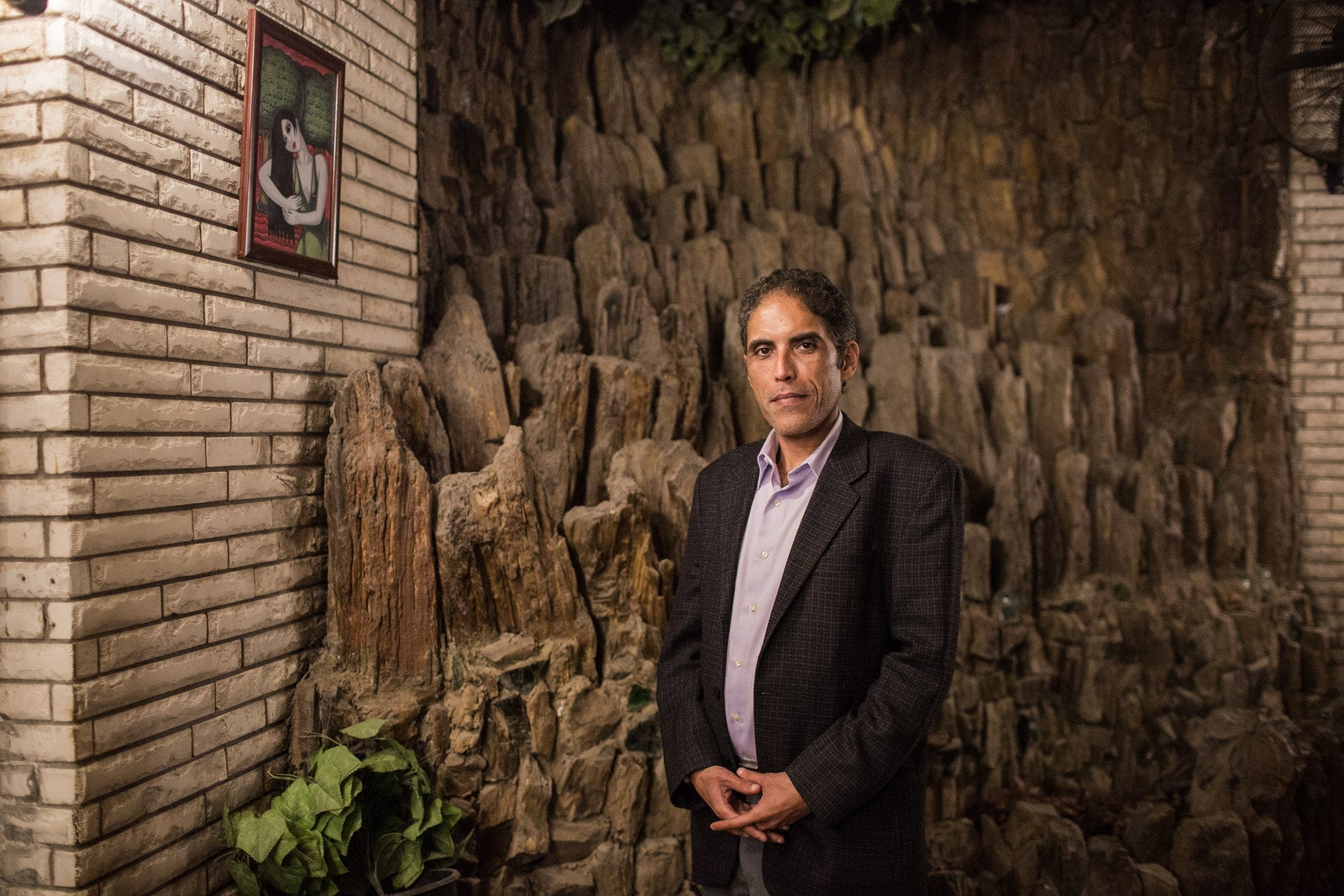
Khaled Dawoud is the upbeat and dapper president of the liberal Dostour Party. Thin, clean-shaven, and with angular features, he tried to put on a cheery front as he discussed politics in Egypt. But he couldn’t hide how haunted he felt by Trump. For years he worked as Washington correspondent for Egypt’s al-Ahram Weekly and still visits the US and closely follows US politics. He stayed up all night watching the election and grew anguished over the results — and the consequences it would have for his country.
“I never thought America was going to make or break our democracy,” Dawoud said during an interview at Le Grillon, a downtown restaurant popular with activists. “The fight for democracy is our fight. The fact some international players are willing to speak out for us in public is not the key factor, but it’s helpful. This is our lesson of the last 40 years or so.”
In noisy teahouses and cafés, liberals, leftists, and Nasserists — supporters of the socialist policies of Egyptian former president Gamal Abdul Nasser — gather nightly, sip tea, play backgammon, and quietly talk. These are the people who were at the vanguard of the Tahrir Square uprising against Mubarak’s government. Some supported the coup against Morsi, before it turned on them. Those who still wander free wonder when their turn will come to be jailed or forced into exile. Many are smeared by name in the press controlled by the government or Sisi’s allies.
“Right now, under the rhetoric that they’re protecting you from terrorism, they give themselves an excuse to completely crack down on any opposition,” whispered Ahmed Saidi, a member of the Nasserist Party and a book publisher.
Saidi sat with a friend, Seif Gamal, a 32-year-old member of the Karama Party, and drank tea. Together they described the tricks they use to avoid being picked up by the cops or the amn al-dowleh, Egypt’s dreaded secret police: Keep your voice low and don’t frequent the same places. Informants are everywhere. On second thought, they said, such tricks are useless.
“There’s no formula to stay safe,” said Gamal. “You either talk and take the risk of being arrested, or you shut up. Especially now with social media, it’s impossible to stay under the radar.”
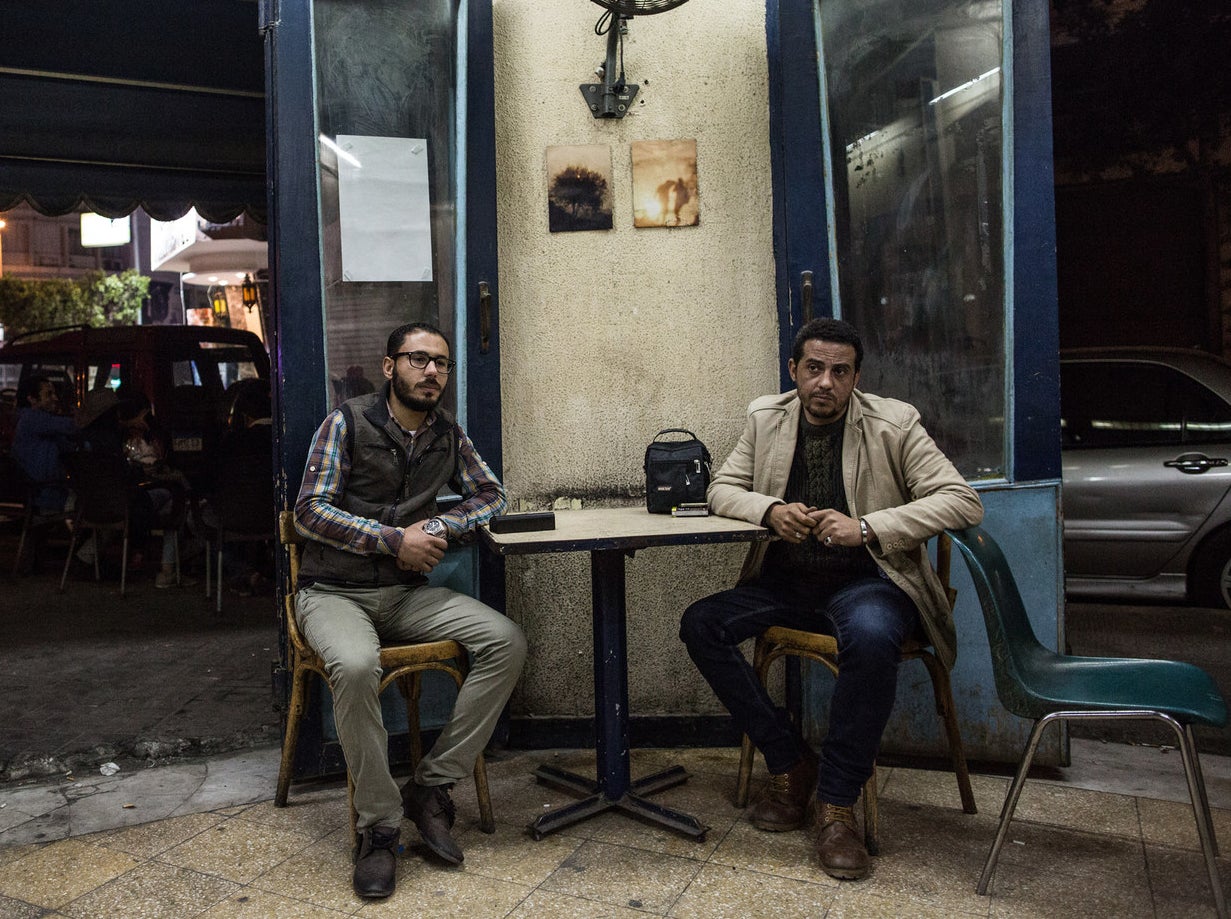
Many of Egypt’s pro-democracy activists have given up, entered academia, the arts, or commerce, or fled abroad. Those remaining are a resilient lot, motivated by love for their country as well as the sacrifices of comrades, including more than 800 killed by Mubarak’s henchmen during the 2011 uprising.
Despite the ongoing crackdown, a few like Dawoud continue to try to remain a thorn in the government’s side. Like the Nadeem Center, many of the organizations that advocated for human rights in Egypt were shuttered. One that persists is the Egyptian Initiative for Personal Rights. On a recent visit, the office buzzed with activity. Phones rang. Lawyers and researchers scurried in and out of what appeared to be the sole conference room.
Until about two years ago, the EIPR was among the most robust human rights and advocacy groups in Egypt, even expanding its work to other countries. It zeroed in on issues of police brutality, religious liberty, economic corruption, and discrimination against minorities and women — the primary subjects at the heart of the malaise afflicting the Arab world.
Some months after the 2011 uprising, the organization moved out of the grimy and densely packed offices in a dilapidated downtown building to large, slick spacious digs with conference rooms and cubicles. It managed to survive Sisi’s 2013 coup and the subsequent crackdown, though not without paying a cost. Its leader, Hossam Bahgat, was briefly jailed before he was released after pressure from the international community and even a personal message by then-UN chief Ban-Ki Moon. He’s since been placed on a travel ban.
Today, EIPR’s access to foreign funding has been cut off. It has moved out of its ultramodern offices into a single floor in one of central Cairo’s fading mansions. More than 70 employees used to work at the organization. Now fewer than 30 do. They meet with each other and with other activist groups and political party officials. They record and document cases of abuse. They issue press releases and launch campaigns on behalf of Christians and other minorities.
“We have downsized,” admitted Dalia Abdel Hameed, the gender and sexuality officer at EIPR. “But our philosophy is that we’re not going to give in to fear. We are not going to make it easy for them. We are going to keep working until they forcibly stop us from working.”
The red lines are difficult to navigate, and like most authoritarian regimes, decisions appear arbitrary. One day an activist is arrested and quickly released. Another day another activist is charged with grave national security crimes and locked up for months. Sometimes a statement from a foreign government gets an activist released from jail and allowed out of the country. Another time it spurs the government to double down in defiance of imperialist interlopers.
“If there is one tip to give activists, it is don’t compromise,” said Abdul Rahman, who also teaches law at American University of Cairo. “Just keep up what you’re doing and be ready for repercussions. They don’t need a strong case to put you in jail. Even secular oppositionists are being accused of providing safe haven for terrorists.”
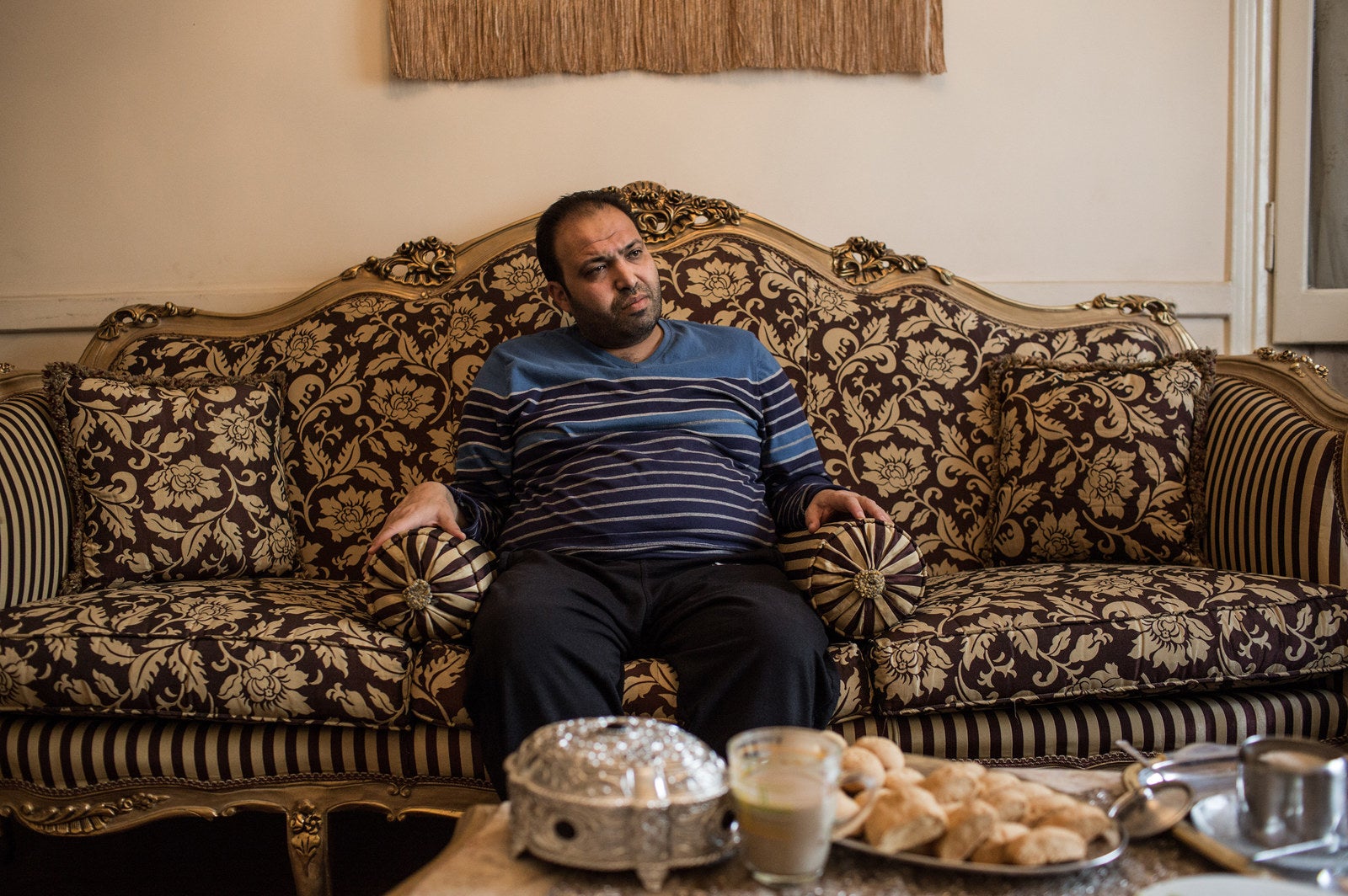
Mohamed al-Qassas sat on the couch of his sparse living room at his modest apartment in eastern Cairo. As the spokesman for the Strong Egypt Party, he’d like to be out practicing politics, giving speeches at public forums or greeting potential supporters. But he mostly stays home these days; he’s been placed on a terrorist list, barred from traveling abroad and kept under close watch. He notes wryly that if he were really a “terrorist,” he probably shouldn’t be allowed to roam free.
Strong Egypt is one of many examples of a political party inspired in part by the democratic values of the US and the West. The party was a liberal offshoot of the Muslim Brotherhood. Its leader, Abdel Moneim Aboul Fotouh, remains one of the country’s main opposition figures. The 65-year-old physician famously broke with the Brotherhood in 2011 over issues of democracy and transparency, taking a number of youthful members, like Qassas, with him. Aboul Fotouh ran for president in 2012 and received 17.5% of the popular vote — more than 4 million votes — in the first round of elections.
The party, founded shortly after the movement, sought to turn Islamists into democrats by wooing leftist and liberal voters. It eagerly took part in workshops on building parties and running election campaigns organized by US and Western organizations, including the National Democratic Institute and the International Republican Institute, which are both funded by the US Congress.
“These weren’t only helping people into democracy, they were a form of soft power for the US,” Qassas said. “Trump is the one who is going to lose if they cut out these programs.”
Like other Egyptians, and even US diplomats under previous administrations, Qassas worries that cutting US support for mainstream political parties while emboldening Sisi to further constrain the country’s political space is not only morally repugnant but will ultimately backfire, undermining the very security agenda Trump says he is pursuing.
"Our philosophy is that we’re not going to give in to fear."
Egypt is fertile ground for radicalism. The 2011 uprising revealed the magnitude of social forces and demographic realities obscured by decades of authoritarian rule. About 60% of Egyptians are under 25 years old, almost all of them somewhat educated. Internet penetration in the country is high, though not as high as some other Arab countries, and more than 95% of Egyptians have access to satellite television access. This is not the country of farmers that the British colonial overlords and Gen. Gamal Abdel Nasser ruled during the 20th century. The young are alienated, disenchanted, and disconnected from Sisi, whose televised diatribes urge the nation to sacrifice more and to shut up.
“All this benefits the radical way of thinking,” Qassas warned. “People get depressed, frustrated, and they think the peaceful path of politics doesn’t accomplish anything, and that’s when they resort to violence.”
Egypt’s pro-democracy activists want to underscore an important point: The original reason the US pushed to open up the political systems of countries like Egypt was that it also served the interests of the West. Egypt, despite the illusion of stability the Sisi government attempts to project, seethes with anger. In early March, riots broke out in Alexandria and in parts of Cairo over the price of bread. Others have broken out across the country over cases of gross police brutality, like when a cop in Cairo shot dead a man selling tea on the street after an argument over a few Egyptian pounds. The country’s currency has plummeted from about six Egyptian pounds to the dollar five years ago to 18 to the dollar today, while wages have remained stagnant.
The government has shut down or is in the process of shuttering any independent trade unions, denying Egyptians a chance to bargain for better work conditions. Venues like wedding halls or hotels reject any attempt to organize political or cultural events outside of Cairo, leaving few channels for normal expression of politics. Predictably, Egyptians are abstaining from mainstream politics, refusing to join political parties for fear they will be tarnished by the government, while businesspeople are refusing to donate money to opposition political parties, which are quickly fading as vehicles to marshall discontent into peaceful channels.
Despite the stifling atmosphere, Egyptian activists like Balshy are eager to pursue ordinary politics. He’s fighting the accusations against him in the courts and in the pro-government press. He continues to help fellow journalists though he’s been forced out of the leadership of the syndicate. He continues to edit his website, which covers the fate of political prisoners and bears his name prominently on the homepage.
He recalled the boost of energy and optimism the peaceful protests against Sisi generated a year ago, and how they lifted the spirits of those seeking change.
“I feel we did something,” said Balshy. “I feel it was the first step to stab or wound the regime, that it’s really going somewhere. The situation, of course, is stressful, but we are trying to continue, and a large number people are trying to make their presence felt.”

